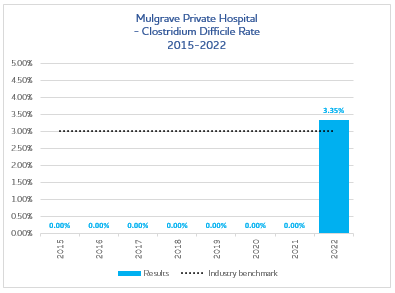Patient Outcomes
As part of our quality framework, we regularly measure and benchmark ourselves against a range of 'Clinical Indicators'.
In accordance with the National Safety and Quality Health Service Standard 2: Partnering with Consumers, the contents of this page have been reviewed by our Consumer Advisory Committee.
![]()
Infection Rate (Staph Aureus Bacteraemia or SAB)
Mulgrave Private Infection Rates
Germs can cause an infection known as staphylococcus aureus bacteraemia (SAB) which needs antibiotic treatment if it enters the blood. Some serious strains are resistant to antibiotics.
Mulgrave Private's rate of infection is well below the national average for hospitals. To reduce the risk of hospital acquired infections, we use best practice infection prevention and control with a focus on hand washing as this is the most effective way to stop germs spreading or entering the blood.
We provide continual education and training to all our caregivers to ensure we keep our infection rate well below the national target.
The graph below shows the number of patients that developed a hospital acquired Staphylococcus Aureus Bacteraemia (SAB) infection. Mulgrave Private has a number of risk mitigation strategies in place to reduce the risk of transmission of Health Care Associated Infections.
The most valuable prevention is for everyone to wash their hands, patients, visitors and health professionals alike.
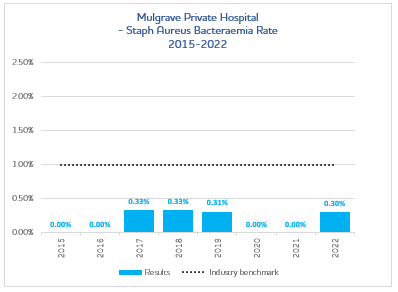

Hand Hygiene
Mulgrave Private Hand Hygiene Compliance
Hand hygiene using an alcohol based hand rub or washing with soap and water, is one of the most important interventions to prevent transmission of pathogens.
Mulgrave Private Hospital educates and audits healthcare workers compliance with the World Health Organisation’s (WHO) “five moments” of hand hygiene. Our results are reported to the National Hand Hygiene Initiative (NHHI)and monitored and discussed monthly through our Infection Prevention Committee.
Mulgrave Private hand hygiene compliance rate is currently below the national targets for hand hygiene. All of our clinical departments have accredited hand hygiene auditors who, in addition to auditing hand hygiene compliance, provide real time evaluation and feedback to promote best practice locally. The graph below shows Mulgrave Private's Hand Hygiene compliance rates.
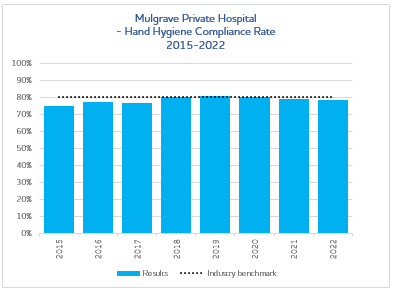
![]()
Inpatient Falls with Injury Requiring Intervention
Mulgrave Private Patient Fall Rates
A fall in a hospital is when a patient suddenly and unintentionally falls to the ground. This can happen in a hospital setting for a number of reasons, such as a change in medication, the after effects of an anaesthetic, or just because the surroundings are unfamiliar. Falls can injure patients and affect their recovery and independence.
This graph below shows the number of patients that sustain a fall that caused an injury as a percentage of total patient bed-days (the number of days that all patients spend in hospital).
We achieve a very low rate through our established Falls Prevention and Management Program and an electronic Incident/Risk Management and Reporting System. A variety of best practice tools and prevention intervention guidelines are utilised to identify those patients/consumers at high risk of having a fall.
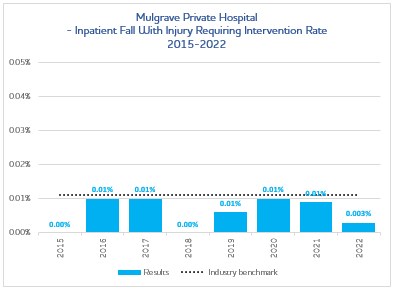
![]()
Unplanned Re-Admissions
Mulgrave Private Unplanned Re-Admissions
The rate of unplanned re-admissions provides an indication of the effectiveness of our planning processes, for when people are discharged from hospital.
The graph below shows the number of patients that were re-admitted to Mulgrave Private within 28 days of discharge from hospital, with a diagnosis related to the same condition as the original admission.
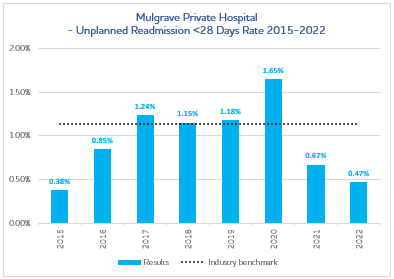

Pressure Injuries
Mulgrave Private Pressure Injury Rate
A pressure injury is an area of damage to the skin and underlying tissue caused by constant pressure or friction that can sometimes occur when a patient is in one position and unable to easily move for a long period.
Pressure injuries can be prevented. We also help to reduce the likelihood of our patients developing pressure injuries during their hospital stay, by assessing their individual risk and follow individual care plans.
As part of our clinical care, we inspect skin frequently, keep skin dry, ensure patients have access to the best nutrition and hydration, and help and encourage patients to move frequently.
This is very important in maintaining quality care as pressure injuries can cause significant pain and discomfort that can slow a patient’s recovery.
The graph below shows the rate of patients that developed a pressure injury while in hospital. Mulgrave Private Hospital’s rate is lower than the industry benchmark.
We achieve this rate through an established Pressure Injury Prevention Management Program and the reporting and monitoring of every pressure injury for the purposes of identifying areas for improvement.
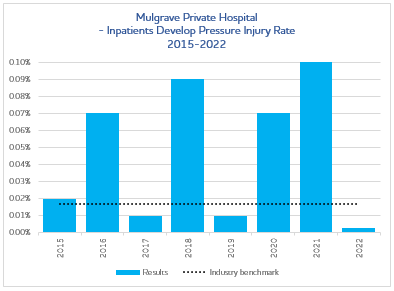

Unplanned Return to Operating Theatre
Mulgrave Private Unplanned Return to Theatre Rate
Mulgrave Private's doctors undertake surgery in many specialty areas, which range from minor procedures to more complex surgery requiring specialised care. We monitor our patient outcomes by comparing any unplanned returns to the operating theatre to other Australian hospitals nationally. The aim is to reduce returns to the operating theatre where possible; however there are many factors which influence this, and in some cases it is necessary to have further surgery to save a life.
Unplanned returns to the operating theatre are frequently due to complications, for example to treat bleeding or other problems occurring early after the operation. Some complications following complex surgery are to be expected due to patients’ pre-existing diseases or conditions and the nature of the disease or condition being treated. Unplanned returns to the operating theatre are reported and clinical outcomes analysed. Recommendations are actioned and monitored to ensure improvements are made where possible.
The graph below shows the number of patients who had a surgical procedure or operation and required an unplanned return for further surgery during the same admission. Mulgrave Private's rate is above the industry benchmark.
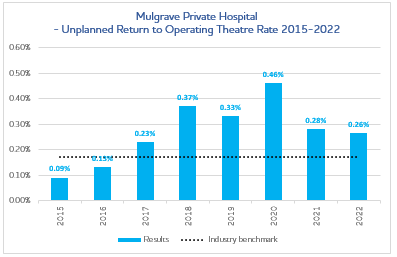
![]()
Clostridium Difficile
Mulgrave Private Clostridium Rate
Clostridium difficile or C-Diff is a germ that causes infection of the bowel and diarrhoea. Almost all cases follow the use of antibiotics. The industry rate varies from two to three cases per 10,000 days of patient care.
The graph below shows the Clostridium Difficile infection rate at Mulgrave Private is slightly above industry average. To reduce the risk of all hospital acquired infections, we implement evidence based infection prevention and control strategies, with a strong focus on appropriate antimicrobial usage. This is governed by our Antimicrobial stewardship Committee and our Infection Prevention Committee.
All cases of C-Diff are investigated by our dedicated Infection Prevention and Control Nurse and discussed through governance structures. This is further supported by ongoing audit and evaluation, targeted education and initiatives endorsed through AMS committee.
